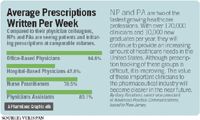Direct to Consumer: Perpetuating Prescribing Myths
The current DTC ads, through their persistent use of the term "doctor," are misleading to the public and keep all other prescribers invisible to patients.
DTC advertising has the potential to positively affect its target audience. It can enable people to become educated about diseases and the products that can help them cope or alleviate their conditions. It may even drive them to request a product from their doctor. But DTC can also serve to confuse some consumers. For nurse practitioners (NPs) and physician assistants (PAs), the problem usually lies within the use of these two phrases: "You must see a doctor, because only a doctor can prescribe xxx." Or, "Only a doctor can diagnose xxx."

David Mittman
While 35 years ago these statements were true, today they are not. PAs and NPs, who are collectively known as advanced practice clinicians (APCs), can and do prescribe, often writing 16 to 22 prescriptions each day. Over the last three decades or so, APCs have grown from a few thousand clinicians to more than 170,000. While the majority of them provide primary care services, they practice in nearly every field of medicine.
Demystifying APCs
The number of APCs has grown as more and more states have passed prescriptive practice legislation. Both PAs and NPs also can prescribe in the Veteran's Administration Medicine system and in all branches of the US military. As it is, more than 95 percent of APCs can legally prescribe. Only three states currently do not allow APCs to prescribe (Georgia prohibits NPs and Ohio and Indiana prohibit PAs). But all three states expect to introduce legislation this year to allow prescribing.

R. Mimi Clarke Secor
One of the benefits of allowing APCs to prescribe is to provide increased care for people in rural and underserved areas. In fact, military PAs and NPs are providing a significant amount of emergency and trauma care in Iraq and Afghanistan. While other segments of the medical system have embraced them, NPs and PAs are concerned that pharma marketing companies have not recognized that they too are prescribers.
Even though most states allow APCs to prescribe, many consumers still believe that only doctors can diagnose conditions and prescribe medications. At a minimum, the current DTC ads, through their persistent use of only the term "doctor," are misleading to the public and keep all other prescribers invisible to patients. People are getting mixed messages as to who can prescribe and who can't. These messages fragment the system and may cause patients to seek out a doctor for medicines that other clinicians can prescribe.

Average Prescriptions Written Per Week
"These ads really confuse patients," says Elayne DeSimone, PhD, ANP, professor at the Stony Brook Nurse Practitioner Program. "They may have just received a prescription from us during a visit where we educated them that we were not physicians and we do prescribe. Then they get 20 messages per day saying only a physician can do these things."
These ads can also be hurtful to PAs and NPs who may feel they are not being recognized for what is a very important part of their professional role. According to a survey published in Clinician News in 2003, 87 percent of NPs and 80 percent of PAs said they found the phrase "Only your doctor can prescribe" offensive when used in DTC advertising.
While these ads are clearly a source of frustration for APCs, their specific impact on the industry is difficult to track. Because PAs and NPs do not have medical education numbers, which are the most commonly used way of tracking a prescriber's prescriptions, it's difficult to track prescriptions accurately. Furthermore, sometimes APC prescriptions are attributed to a doctor who is on the Rx pad too, or pharmacists may put down a physician's name rather than a nurse's or assistant's in an effort to ensure that an insurance company will reimburse them.
Resistance to Inclusive Language
Another roadblock to correcting the language used in these ads is FDA's requirements. FDA has the jurisdiction to regulate DTC advertising, but only regarding information given about the products, not the professional terminology used. According to an FDA spokesperson, the Federal Food, Drug, and Cosmetic Act requires DTC advertisements to include a "brief summary" regarding the product's side effects, contraindications, and effectiveness. Broadcast ads may make what is called "adequate provision," that is, feature a toll-free number and Web site address, reference to a print advertisement, and/or a suggestion to consult a healthcare professional for more information.
FDA feels the ads should communicate that the advertised product is available only by prescription and that only a prescribing healthcare professional can decide whether the product is appropriate for a patient. It does not require that the pharmaceutical company tell consumers that only physicians can prescribe.
Then who makes this marketing decision? In talking to those who work at ad agencies, some have said they feel the guidance from FDA forces them to say "Only your doctor can prescribe xxx," even though legally it does not. "We submit all our DTC advertisements for approval by the FDA before we air them," says a spokesperson for Merck. "We've never been asked to change 'physician' to 'healthcare professional.'"
"The purpose of the guidance is to offer industry a way to convey necessary risk information to the consumer," says Lesley Frank, a professional review group leader at FDA's Center for Drug Evaluation and Research, in an article previously published in Clinician News. While the terminology may seem to violate the guidance, it fulfills the regulatory requirement—stating that the drug advertised is available only by prescription and through a "qualified prescriber." Thus, FDA has no recourse to penalize a drug company for making misstatements about who can prescribe.
Taking Action
Numerous APC organizations are urging drug manufacturers to adopt inclusive terminology in DTC advertising. The American College of Clinicians (ACC), for example, would prefer that agencies use "prescriber" or "healthcare professional" rather than "doctor." They started a letter-writing campaign directed at the Secretary of Health and Human Services, who oversees FDA, to advance this cause.
"'Prescriber' should be preferred," says Bob Blumm, president-elect of the ACC. "If a patient can understand what the drug is used for by watching these ads on television, they can understand the word prescriber."
Furthermore, APCs aren't the only ones who can prescribe—nurse midwives and other advanced practice nurses prescribe too. "Soon, some states will be adding psychologists," says Roger Green, president of the Florida Nurse Practitioner Network.
While some companies have included all prescribers in their marketing terminology, most have not."We really do not want to attack the companies," Blumm says. "We want to work hand in hand with them to fix this problem."
People
Stonefly Communications Group made some human resources changes: Brad Lewis and Terri Spring were named vice presidents, client advisors. Lewis and Spring both worked for sister company GSW Worldwide. Sarah Schwabauer also joined the Stonefly team as an account executive and Cendi Eblin was hired as a copywriter. » Mary Beliveau joined MIC Communications as senior vice president of marketing. » Kane and Finkel Healthcare Communications hired Jonathan Peischl as vice president, creative director.

Sarah Schwabauer
Accounts
Concentric won its bid to develop the launch campaign for a new drug product from specialty pharmaceutical company Warner Chilcott. » Kimberly-Clark Health Care selected Adair Green Healthcare Communications as its agency of record. Adair Green will work on Kimberly-Clark's healthcare division's corporate identity campaign, product launch, pre-launches, concept development, and strategy for new technologies.

Cendi Eblin
Launches
As part of an effort to educate patients with cancer and their families about participating in clinical trials, The American Society for Therapeutic Radiology and Oncology has published a brochure, Understanding Clinical Trials: Facts to Help Patients Make an Informed Decision. » Fission Communications launched a new division, Fission Meeting Management Services.

Mary Beliveau
David Mittman, PA, is a senior vice president of Advanced Practice Communications. He can be reached at dave@mittman.us
R. Mimi Clarke Secor, FNP, is president/advisor of Nurse Practitioners Associates of Continuing Education. She can be reached at msecor@npace.org

The Misinformation Maze: Navigating Public Health in the Digital Age
March 11th 2025Jennifer Butler, chief commercial officer of Pleio, discusses misinformation's threat to public health, where patients are turning for trustworthy health information, the industry's pivot to peer-to-patient strategies to educate patients, and more.
Navigating Distrust: Pharma in the Age of Social Media
February 18th 2025Ian Baer, Founder and CEO of Sooth, discusses how the growing distrust in social media will impact industry marketing strategies and the relationships between pharmaceutical companies and the patients they aim to serve. He also explains dark social, how to combat misinformation, closing the trust gap, and more.